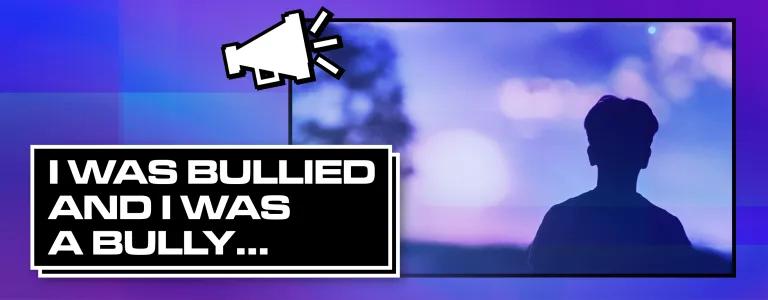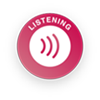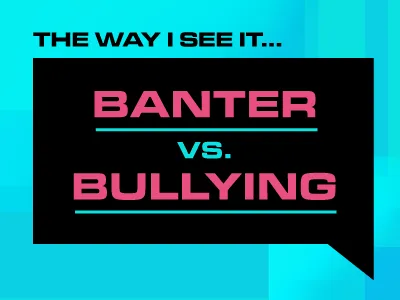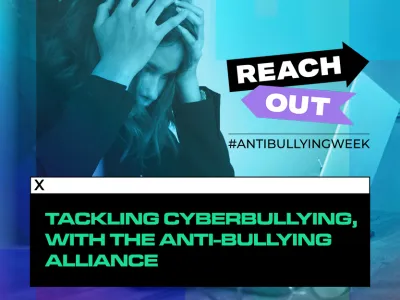
I Was Bullied And I Was A Bully…
Include this article in your Skills Builder Journal. It could help you develop...

An anonymous Writers’ Club member shares their story of being both bullied and bullying…
In honour of Anti-Bullying Week, I’m going to be talking about bullying; what it is, the effects it can have from both sides, and the importance of Anti-Bullying Week.
Based on the Oxford English Dictionary, bullying is ‘seeking to harm, intimidate or coerce (someone perceived as vulnerable)’. Anyone can be a victim of bullying and it can happen anywhere. A 2020 study by the Office for National Statistic showed:
- Almost one in five children experience at least one type of online bullying
- Nearly three out of four children (72%) who experienced an online bullying behaviour in the previous 12 months experienced at least some of it at school
- Around seven out of ten children were emotionally affected by online bullying behaviours
Common forms of bullying include physical bullying; using one’s body and physical bodily acts to exert power over someone (which in simpler terms means using violence to hurt someone). There is also verbal bullying where you use language like insults, teasing or even written words, to gain power over someone. These are very detrimental to an individual’s mental and physical health.
Unfortunately bullying can come in all shapes and sizes and each kind is as harmful as the next. There is cyberbullying (using mobile phones, instant messaging, e-mail, chat rooms or social media to harass, threaten or intimidate someone), sexual bullying (using behaviour which degrades someone, singles someone out using sexual language, gestures or violence, and victimising someone for their appearance), prejudical bullying (bullying based on someone’s sexual orientation, gender identity, disability, race and religion or belief) and relational aggression (things like spreading false rumors about another person to embarrass them or ruin their reputation, or making fun of another person for how they dress or what their interests are).
I myself was a victim of bullying during my younger teen years, over something that I felt had no control over. I am currently in my second year of A-Levels and can happily say I overcame the effects bullying had on me.
My experience started in Year 7 I was very extroverted and had a loud bubbly personality. I didn’t quite understand my sexuality and often found myself the target of homophobic comments because I hung around with girls a lot and acted feminine. Words such as ‘gay boy‘ and other harmful deregatory words were used against me. This led to me feeling anxious and no longer viewing my new school as the ‘safe place’ I thought it was. This carried on until Year 9, until I had the courage to speak up. I did this by confronting my bullies, voicing my own fears to my school counsellor and understanding my personal hatred for who I was, and why instead I should be proud and not allow other people’s words to control me. Fast forward into my late teenage years, and I rarely encountered verbal bullying and even started understanding my sexuality and who I was and wanted to be. My advice for anyone who is being bullied is to remember that you are never alone and hard times don’t last forever.
Unfortunately, despite being bullied and knowing how it can affect someone, I became a bully myself. This isn’t something I’m proud of and have grown as a person from it. But it is important to understand why people bully and why it is often seen as a ‘defence mechanism‘ from being bullied.
It started when I came back from studying abroad for two years. Unfortunately, despite the experience helping me grow and become academically stronger and achieving my dream GCSE results, I suffered from severe mental health issues, which took over a year for me to combat. When I entered Year 12, I was certain not to become a victim of bullying and go through what I had gone through in the past. I became more confrontational and impulsive, especially when I felt threatened. This got me involved in a lot of arguments during the first half of Year 12 and I’d often say harmful things as a response to something I didn’t agree with, or when I felt challenged. This took my attention away from school and my extracurriculars. When I received my mock results and it wasn’t what I had hoped, I was disappointed and felt like I failed myself.
From that day forward, I tried to avoid drama whenever I could. I surrounded myself around people with high aspirations and just wrote down all my feelings. This helped me reflect on the person that I wanted to be and I had a more positive outlook on life. I’m not going to sit here and say I completely changed as a person but I matured and grew up as a person, being consistent wherever I could.
My experiences from both sides have helped me understand the importance of Anti-Bullying Week. Anti-Bullying Week was created by the Anti-Bullying Alliance. It takes place from Monday 14 November to Friday 18 November 2022. The theme for this year is Reach Out, which is about empowering people to do something positive to counter the harm and hurt that bullying causesIn 2021, 80% of schools participated in Anti-Bullying Week, reaching over 7.5 million children and young people. This year is starting with Odd Socks Day where we wear odd socks to show uniqueness. Many things are happening this year so keep a look out and spread awareness wherever you can!

Remember that you are never alone and you are powerful for being here. If you feel as though you are a victim of bullying or know someone who is bullied, you can get in touch with The Mix (a UK charity who provide free, confidential support for young people under 25) who have a free crisis messenger service, or call Childline on 0800 1111 to talk to a professional. Alternatively, you can start conversations with a friend or someone you trust about how bullying makes you feel. And don’t forget, YOU ARE AMAZING and you’ve got this!




